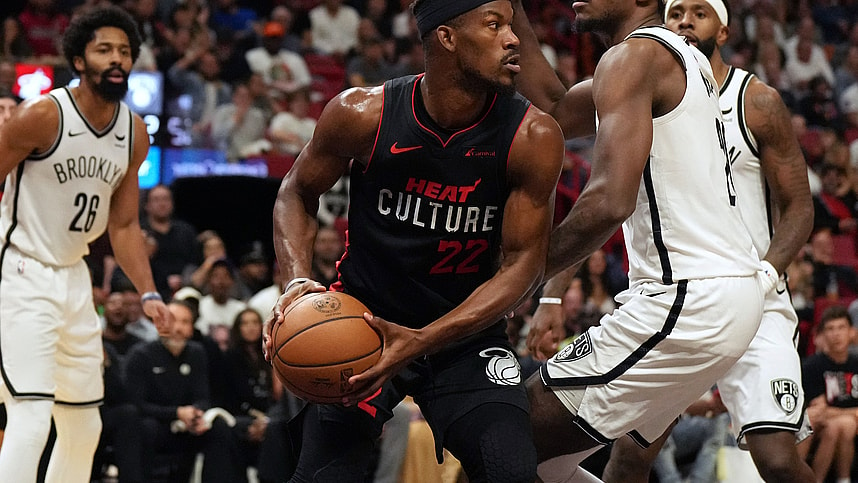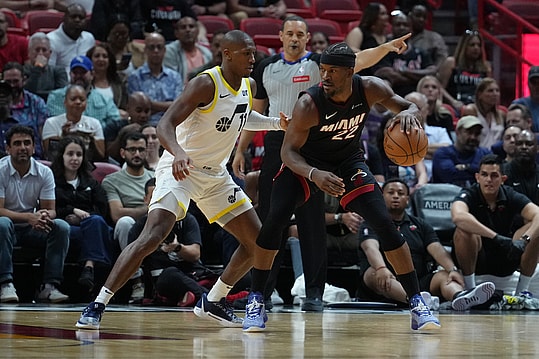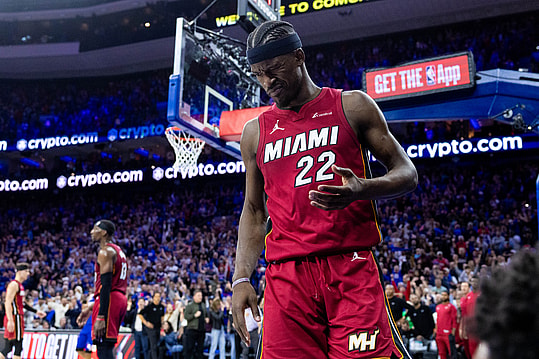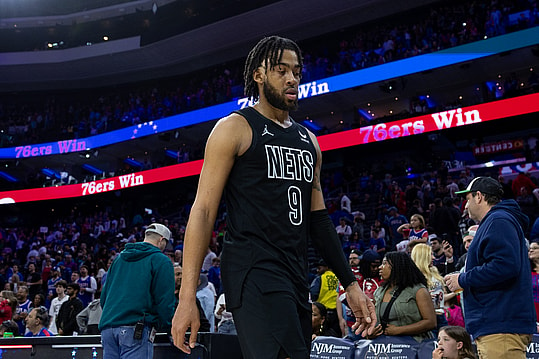
With the 2024-2025 season looking to be a lost year for the Brooklyn Nets, many are already looking to the 2025 offseason for a glimmer of hope. While the 2025 NBA draft is the primary reason for optimism for Nets fans who dream of watching Cooper Flagg lead a dynasty in Brooklyn, the Nets are also projected to possibly have over $70 million in cap space next offseason. Speculation has started to run rampant as to what they’ll do with all that cap space.
Jimmy Butler has become a popular projected target for the Nets in 2025
We’ve already discussed the Nets pursuing an expedited rebuilding timeline, and the aforementioned draft class and cap space are big reasons why that could become a reality. The idea of pairing a generational young talent like Cooper Flagg with a veteran star while maintaining the promising young core of Cam Thomas, Noah Clowney, Nic Claxton, and others is reason for hope that the Nets could be among the NBA’s top contenders as soon as next year.
It’s important to note that free agency has changed since 2019 when the Nets made waves by signing Kevin Durant, Kyrie Irving, and Deandre Jordan. Now star players are much more likely to agree to contract extensions with their current team before forcing their way to their preferred destination, much like Kevin Durant did before forcing a trade to the Phoenix Suns.
With the change in NBA free agency culture, the excitement of a star hitting the open market has diminished. However, one of the stars of the 2025 free agent class, Jimmy Butler, has got the rumor mill swirling that he’ll be a member of the Brooklyn Nets.
Not only are the Nets one of the few teams that could pay Butler, but reports are that he’s fond of the idea of playing in Brooklyn. Adding to that, Butler has made it clear that he will not sign an extension with Miami or any other team that may trade for him ahead of free agency after not seeing eye-to-eye with the Heat regarding his value moving forward. For Brooklyn, the idea of adding a six-time All-Star to an exciting young core is tantalizing.
The Pros of signing Butler

Owner of a career line of 18.3 points, 5.3 rebounds, and 4.3 assists per game Butler has been productive for a long time in the league. He’s capable of carrying the scoring load while also serving as a secondary playmaker on the offensive end. Butler’s calling card, however, is his tenacious defense, which has earned him five All-NBA defense selections.
The 6-foot-7 forward is also a battle-tested playoff veteran who, while never winning an NBA Championship, has been the leader of many deep playoff runs. Known as a fiery competitor on the court and in practice, Butler has at times clashed with organizations he’s been a part of, but he’s also received compliments on his leadership even from established veterans like Kevin Love.
That mentality and vocal leadership would serve a young team learning how to be professionals well, especially as expectations grow. Butler could provide the sort of mentorship that will benefit Brooklyn’s young core long after his potential Nets tenure comes to a close.
The Cons of signing Butler

Some will say that he’s too good of a player to aid the tank, however, that shouldn’t be a concern, as all-out tanks are rarely good strategies to build long-term success.
The bigger issue with Butler is his age and how his game will hold up going forward. Butler is going into his age-35 season this year. While his game hasn’t shown signs of slowing down, he averaged 20.8 points, 5.3 rebounds, and 5.0 assists per game last season. One has to wonder how much longer he can keep it up.
Butler came into the league in 2011, before the three-point revolution, and still plays a throwback style. Last season he averaged 2.4 three-point attempts per game, which is identical to his career average. While he connected on 41.4% of them for his career, he’s just a 32.9% three-point shooter. Instead, Butler prefers to attack downhill with the ball in his hands, pressuring the defense on his way to the rim, which is a style that requires more premium athleticism to pull off than pure shooting.
Defensively, Butler is adept at using both his lateral mobility and his strength to defend the perimeter while also being able to handle bigger players down low. While he’s an extremely high-IQ player, it is that lateral mobility (similar to his strength on offense) that is typically the first to go with age.
While Butler’s excellent feel for the game should help him maximize whatever diminishing skills he may have, his overall play style is not conducive to aging gracefully. That means a potential decline could be precipitous, and with Butler likely looking to cash in one more time, that could mean his potential new contract may quickly become an albatross.
The Bottom Line

While the Nets will have a lot of cap space they need to spend, it’s important to remember that it may not be as infinite as it appears on paper. Cam Thomas is due for an extension, which should be a priority and may end up being costly. Other young role players such as Day’Ron Sharpe and Trendon Watford will be looking for new deals as well. Watford, in particular, has the potential to drastically outplay his current rate. Veterans like Dennis Schroder and Dorian Finney-Smith are also on expiring deals.
This isn’t to say the Nets won’t have money to spend, they will. However, they would be wise to prioritize that any big money deal goes to a player who will be part of the next stage of the rebuild as well as the entirety of the future contending timeline. Doing otherwise would simply be spending money for the sake of spending it, which rarely produces sustained success.
More about:Brooklyn Nets